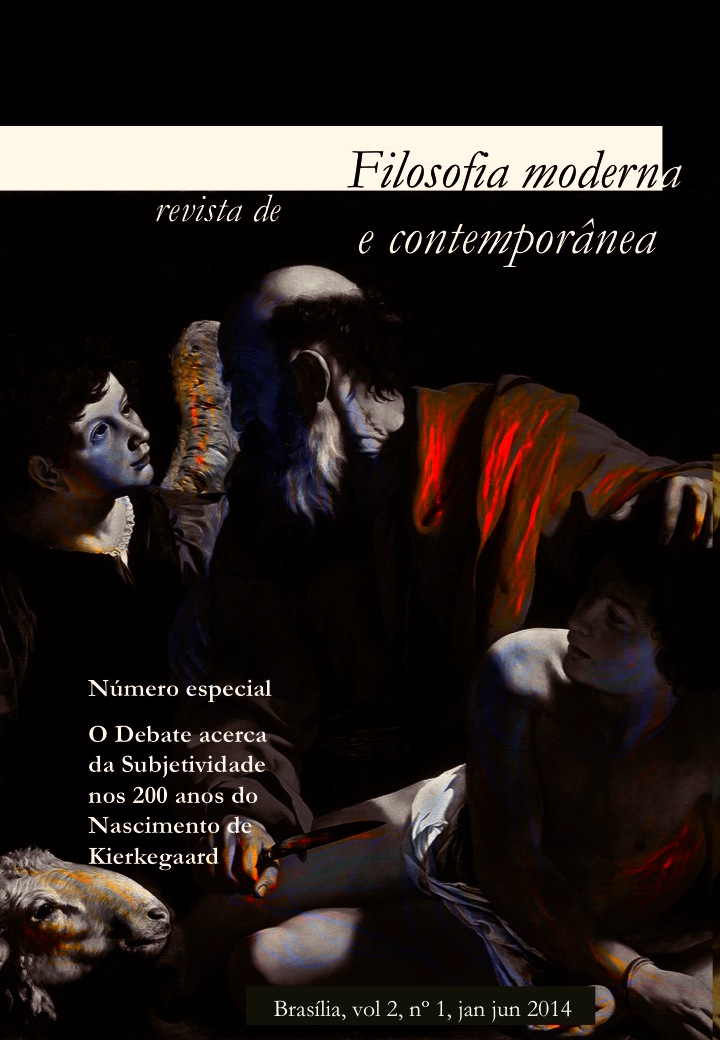The work of Kierkegaard and his place in the history of modern philosophy
DOI:
https://doi.org/10.26512/rfmc.v2i1.12441Keywords:
Dialectics, Experience, Individual, HistoryAbstract
This article envisages to put the significance of Kierkegaard into the whole context of the history of modern philosophy. After a characterization of the determinant moments of the history of modern philosophy in its dialectical relations with the historical process in times of revolutionary development of society, the ar ticle reconstitutes Kierkegaard arguments about the absolute and no dialectical opposition between the lived experience of individuals and the rational thinking so as to present them as a determined moment of the development of modern philosophy.
References
DESCARTES, R. Discurso do Método. São Paulo: Ed. Abril, 1979.
FOUCAULT, M. O Nascimento da Biopolítica, São Paulo: Martins Fontes, 2008.
HEGEL, G.F.W., Fenomenologia do Espírito. Petrópolis: Vozes, 1988.
HEIDEGGER, M., Ser e Tempo. Petrópolis: Vozes, 1989.
HOBBES, T. Leviath, Oxford: Clarendom Press.HUME, D. Tratado da Natureza Humana. São Paulo: UNESP, 2009.
KANT, I. Crítica da Razão Prática Ed. Bilíngue. São Paulo: Martins Editora.
KANT, I. http://www.lusosofia.net/textos/kant_immanuel_conflito_das_faculdades.pdf.
KIERKEGAARD, S. Diário de um Sedutor. São Paulo: Abril, 1979.
KIERKEGAARD, S. Temor e Tremor. São Paulo: Abril, 1979.
KIERKEGAARD, S. O Desespero Humano, São Paulo: Abril, 1979.
KIERKEGAARD, S. O Conceito de Angústia. Petrópolis: Vozes, 1990.
LUKÁCS, G., Existencialismo ou Marxismo?Ed. Ciências Humanas, 1979.
MARX, K., Capital. Rio de Janeiro: Civilização Brasileira, 2003.
NIETZSCHE, F., Sammlung. Stuttgart: Alfred Kröner Verlag, Deutschland, 1978.
SARTRE, J.P. Crítica da Razão Dialética. São Paulo: DPP, 2002.
SARTRE, J.P. “Questão de Método”. In Os Pensadores. São Paulo: Nova Cultural, 1987.
SMITH, Adam. An Inquiry into the Nature and Causes of the Wealthof Nations. Chicago: Encyclopeadia Britannica, 1952.
Downloads
Published
Issue
Section
License
Copyright for articles published in this journal is retained by the authors, with first publication rights granted to the journal. By virtue of their appearance in this open access journal, articles are free to use, with proper attribution, in educational and other non-commercial settings.


